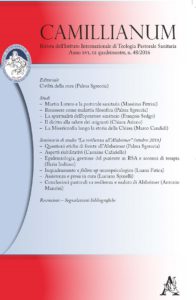From Camillianum, Rivista dell’Istituto internazionale di Teologia Pastorale Sanitaria, year XVI, III quarter, n. 48/2016
On the occasion of the Jubilee of Mercy it was especially interesting to try to make people informed of the fact that this feeling was well known by the peoples of pagan antiquity and that they also conceived of feelings of pity and mercy, although severely identifying excesses in the application of both. We have testimony of this in the poems of Homer which, indeed, form a basis for our civilisation. There is no lack of examples in the application of law of the use of aequitas, equity, which in the later Roman and medieval compilations of law (as well as in canon law) was also forceful. In the Roman world, more than mercy it was clementia that had great importance. The Romans managed to make a distinction perfectly – both in daily life and in legal questions – between the feeling of mercy and the application of clemency. This was due to the fact that the term pietas in Rome emphasised both love for humanity and uprightness and devotion towards the gods and the State. The decline of respect for pacts in the international field, for example, transformed Roman clemency into a reaction that did not know pity until the total and unconditional surrender of the enemy, whose divinities, however, were respected! Seneca wrote that clemency had to be something specific to the Emperor, because a Vital Spirit, Mens Imperii, the spirit that ordered the human community. Through clemency, the Emperor conformed himself to the laws of nature, to natural law, which for Seneca was perfect compared to the imperfections of positive law. We should also remember, lastly, an ‘archaeological’ proof of the importance of clementia in Tebaide by the Latin author Statius who called the altar of Athena avra clementia whereas for the Latin tradition it was ara misericodiae.












Camillians on Facebook
Camillians on Twitter
Camillians on Instagram